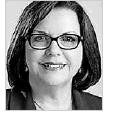Pandemic weighs heavy on those with intellectual, developmental disabilities
Since the COVID-19 pandemic began tearing through the United States, we’ve heard a lot about overloaded systems and the people who are suffering as a result. We’ve heard about our overwhelmed hospital systems and the doctors on hospital front lines. We’ve heard about aging Americans and the professionals on nursing home front lines.
But what we haven’t heard about are people with disabilities — specifically those with intellectual and developmental disabilities — and the direct support professionals on the front-lines. In the midst of this crisis, people with I/DD are the forgotten faces; their DSPs the forgotten front lines.
The coronavirus is silently tearing through the disability community and causing deaths that could be avoided with more government action. In New York State alone, roughly 1 in 6 people with I/DD who contracted the corona-virus died — a much higher death rate than in the overall population. This experience is repeating itself across the country and here in Ohio.
On the forgotten front lines, DSPs are the essential staff that help people with disabilities in their homes and communities daily. DSPs face the same struggles and challenges as other health care workers: insufficient personal protective equipment, repeated exposure to the coronavirus and long hours in the homes of the people they support — sometimes sheltering in place for days when those they support test positive.
This was the case for one gentleman. His DSP team decided to work 24-hour shifts, four days each, because familiar staff provide the best care. Another example is the first DSP to test positive in our agency. After recovery and return to work, she volunteered to work in a home with individuals under quarantine. These are examples of the sacrifices DSPs make routinely.
While Congress and the Trump administration have rightly moved to quickly provide for front line health care workers, they have repeatedly overlooked Medicaid-funded providers of disability services, including the DSPs employed by these providers, all at the expense of the health and wellbeing of our vulnerable neighbors with I/DD.
Now, Medicaid-funded providers are at risk of closure because of massive overtime expenses during the crisis. Rarely do Medicaid providers make the headlines for the incredible work they’re doing during the pandemic, and when they do, it’s for offering DSPs hazard pay or covering overtime. But make no mistake: These providers have no federal funding to do so. We’re doing it because it’s the right thing to do, but we have zero idea how long we will be able to sustain our services.
If we’re forced to close, the impact will be felt not only as this crisis continues to wreak havoc, but also well after the pandemic is over, leaving people with disabilities with too few options and resources to remain in their homes and communities, rather than being relegated to large, state-run institutions.
The stakes are too high for this situation to continue. Congress already has committed funding for essential health care workers, but the U.S. Department of Health & Human Services has yet to allocate any of the $175 billion in funding for the Public Health & Social Services Emergency Fund to Medicaid providers. Therefore, Congress must play its critical oversight role and ensure HHS takes immediate action to stop overlooking people with I/DD and the providers on which they rely.
Meanwhile, Koinonia and similar agencies dive deeper into the red. Being an employer of 640 Ohioans makes us ineligible for the current Paycheck Protection Program funding. The COVID-19 crisis is exposing key vulnerabilities in the I/DD support system. What will people in Ohio with I/DD do after the dust settles from the pandemic? Funding is needed now to stabilize a workforce in crisis by providing increased salaries, sustainability funding for lost revenues due to closed day programs and resources to restart programs.
Without funding to accomplish all we need to do to ensure the health, well-being and inclusion of the people with I/DD we support, we don’t stand a chance of keeping our doors open until this crisis ends. And when we’re gone, so too will be the opportunities for people with disabilities in Ohio to live independently.
Diane Beastrom is the president & CEO of Koinonia, which serves 600 people with I/DD in Northeast Ohio. Diane.Beastrom@KoinoniaHomes.org
